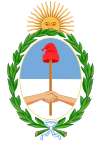The Ministry of Environment and Energy is a ministry or department of the government of Costa Rica.

The Ministry of Foreign Affairs, International Trade and Worship, informally referred to as the Chancellery, is the Argentine government ministry dealing with the foreign relations of Argentina, Argentina's foreign policy, international development, international trade, diaspora and matters dealing with Mercosur and the Catholic Church.

Almost all of Uruguay has a humid subtropical climate. It is fairly uniform nationwide, since the country is located entirely within the temperate zone. Seasonal variations do exist, but extremes in temperature are rare. As would be expected by its abundance of water, high humidity and fog are common. The absence of mountains and other weather barriers makes all locations vulnerable to high winds and rapid changes in weather as fronts or storms sweep across the country. Weather is sometimes humid.
The water resources management system in Uruguay has been influenced by the general sense of water as an abundant resource in the country. Average annual rainfall is 1,182 mm, representing a contribution of 210 km3 annually throughout its territory. In 2002, the per capita renewable water resources was 41,065 cubic meters, way above the world average 8,467 m3 in 2006. Uruguay also shares one of the largest groundwater reserves in the world, the Guarani Aquifer, with Brazil, Argentina, Paraguay. The Guarani aquifer covers 1,200,000 square kilometers and has a storage capacity of 40,000 km3.
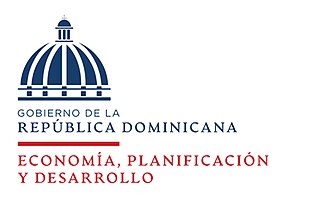
The Ministry of Economy, Planning and Development of the Dominican Republic is a government institution which coordinates the country's macroeconomic politics and sustainable development. It regulates the National System for Development and Public Investment, controls the statistics programs, evaluates the impact of economic actions, establishes the international cooperation politics, among other roles.
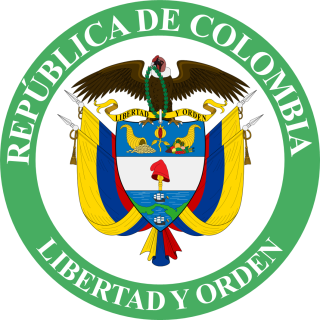
The Ministry of Environment and Sustainable Development is the national executive ministry of the Government of Colombia in charge of formulating, implementing, and orienting environmental policy to ensure the sustainable development of the country.
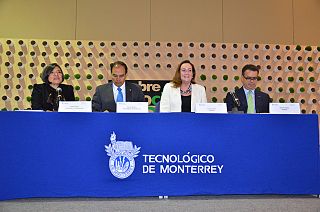
Instituto Global para la Sostenibilidad is a globally and environmentally focused organization founded by María Isabel Studer Noguez at the Tec de Monterrey, Mexico City Campus in collaboration with Arizona State University (ASU). It was founded as an extension of the ASU's Global Institute for Sustainability as an extension, the first and only one of its kind in Latin America. The institute holds and sponsors research, educational events and program and activism on its own and in collaboration with business, educational and governmental agencies.
The Uruguayan savanna ecoregion used to be covered by grasslands, palm savannas, and gallery forests along the Uruguay, Negro, Yaguarí, Queguay, and Tacuarembó rivers. Unfortunately, agriculture and cattle ranching have heavily altered these natural communities. The savannas are critically endangered because there are few small isolated patches of intact habitat remaining. The whole ecoregion has been severely altered by cattle ranching, one of the main pillars of the national economy in Uruguay. About 80% of Uruguayan territory is used for cattle ranching on natural and artificial savannas.
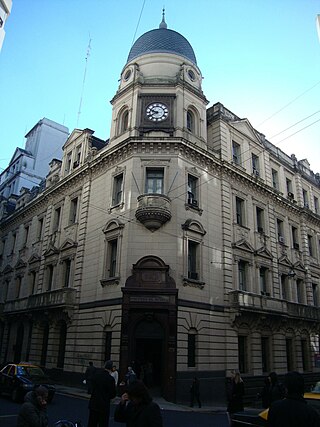
The Ministry of the Interior of Argentina is a ministry of the national executive power that manages issues pertaining to domestic politics such as immigration and co-ordination between the federal government and the governments of the provinces of Argentina.

The Ministry of Transport of Argentina is a national executive agency that manages transportation issues, including land, air, and sea transportation within the country.

The Ministry of Health of Argentina is a ministry of the national executive power that oversees, elaborates and coordinates the Argentine national state's public health policy. The ministry is responsible for overseeing Argentina's highly decentralized universal health care system, which according to 2000 figures, serviced over half of the country's population.

The Ministry of Productive Development of Argentina was a ministry of the national executive power overseeing and advising on the promotion of industrial policies and foreign trade in Argentina.
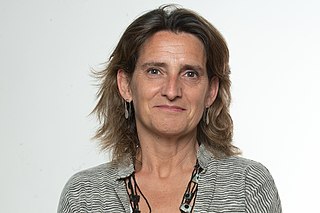
Teresa Ribera Rodríguez is a Spanish jurist, university professor, and politician who has served as the Minister for the Ecological Transition of Spain since 2018, after Prime Minister Pedro Sánchez coming into power following the successful no-confidence motion against Mariano Rajoy. In 2020, she was appointed Fourth Deputy Prime Minister and in 2021 she was promoted to Third Deputy Prime Minister.

The Ministry of Agriculture, Livestock and Fisheries of Argentina, commonly known simply as the Ministry of Agriculture, is a ministry of the national executive power that oversees production, commerce and health regulations in the agricultural, livestock and fishing industries.

The Ministry of Territorial Development and Habitat of Argentina is a ministry of the national executive power that oversees and defines the Argentine state's policies on housing and habitat.
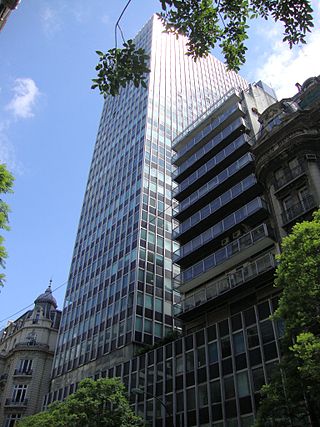
The Ministry of Tourism and Sports of Argentina is a ministry of the national executive power that oversees and advises on Argentina's national tourism industry and the Argentine state's sports policy.

Martha Delgado Peralta is an environmentalist and the Undersecretary for Multilateral Affairs and Human Rights at the Mexican Ministry of Foreign Affairs. Delgado Peralta was elected to local congress in 2003. From 2006-2012 she served as Minister of the Environment of Mexico City. During her time as Minister of the Environment she helped to develop environmental policies including Green Plan of Mexico City, the Climate Action Program and a bike sharing program called ECOBICI.

The Ministry of Science, Innovation, Technology and Telecommunications is part of the government of Costa Rica, it was created on 26 June 1990.
Emilio Luis Sempris Ceballos is a Panamanian politician and sustainability advocate. He served as Panama's minister of environment from 2017 to 2019. He also served as director general of the Water Center for the Humid Tropics of Latin America and the Caribbean (CATHALAC) between 2002 and 2012. In 2021, he was appointed as Distinguished Advisor of the Integrity Council for the Voluntary Carbon Market (ICVCM).
Climate change in Uruguay describes the effects of climate change in Uruguay. As the result of global temperature increases, Uruguay is expected to have temperature increases of 3 °C by about 2100 and there is expected increases in precipitation. Increases of climate rain in Uruguay and Argentina during 2018 was estimated by the World Meteorological organization to have caused $2.5 billion in damage.
















